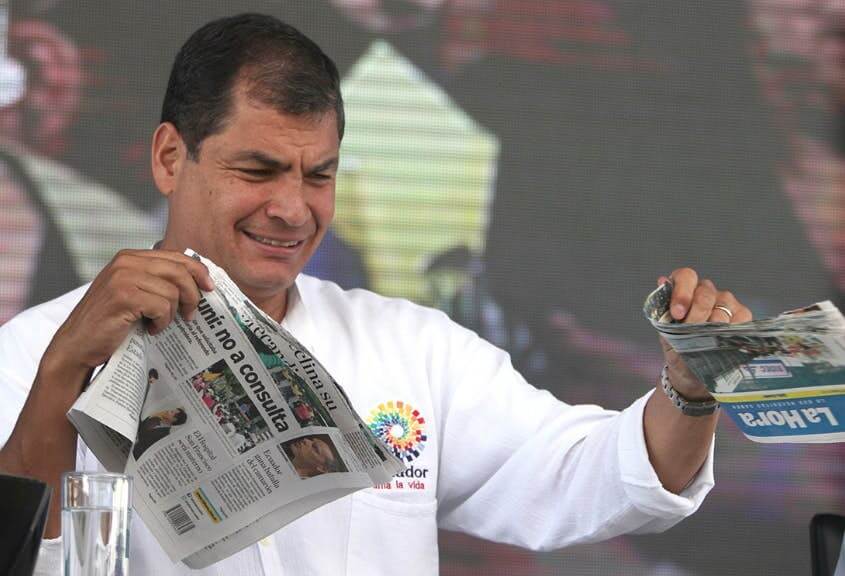NEW YORK (August 13, 2018) — The Human Rights Foundation (HRF) has joined efforts to restore press freedom to Ecuador by submitting two legal briefs to Ecuador’s legislative body exposing former President Rafael Correa’s overt, authoritarian manipulation of the press from 2013-2017. The briefs compile evidence showing that the country’s Organic Law of Communications (Ley Orgánica de Comunicación, or LOC, in Spanish) was used by the Correa administration to control the press, consolidate the regime’s power, and systematically persecute Correa’s critics and opposition leaders. HRF hopes these reports can provide evidence and foster swift reforms under Ecuador’s new leadership.
The first brief was sent to the National Assembly of Ecuador’s Collective Rights Commission in late July and recommends reforms to the LOC to bring the country into compliance with international human rights standards. The second was sent to Edison Lanza, special rapporteur on freedom of expression of the Inter-American Commission on Human Rights, to coincide with the rapporteur’s official visit to Ecuador on August 20-24. HRF hopes that Lanza will use his mandate to make the case for crucial reforms in Ecuador and lend further support to President Lenín Moreno’s reform efforts.
“With these legal briefs, HRF hopes to contribute to the dialogue process that will allow for the restoration of the guarantees needed for the full exercise of the right to freedom of expression,” said Mauricio Alarcón, HRF’s Senior Legal Associate. “We are confident that, very soon, Ecuador will be able to overcome the climate of censorship and persecution that has prevailed over the last decade.”
In the legal brief sent to the special rapporteur, HRF presents evidence that the government of former President Correa manipulated state radio and television stations to insult and persecute critics of the government. In one example, Correa used his show “Enlace Ciudadano” (“Citizen’s Link”) and other press appearances to publicly order administrative sanctions and criminal investigations, flaunting his absolute power over governmental institutions in order to intimidate his opponents. The brief also presents statistics showing how the LOC caused an increase in censorship and self-censorship, and analyzes the systematic persecution of the press and the democratic opposition, attacks against civil society organizations, and the criminalization of the right to protest.
The legal brief sent to the National Assembly focuses on suggested reforms to the LOC, and aims to remind legislators that the international standards on free speech and expression are part of Ecuadorean law because the country has signed and ratified key international treaties, including the International Covenant on Civil and Political Rights and the American Convention on Human Rights. HRF’s brief stresses that Ecuador must repeal the “public service” designation over media imposed under Correa — an interpretation that Ecuador’s Constitutional Court has recently supported. HRF also called on the National Assembly to eliminate abusive LOC provisions, including its draconian fines and penalties, to remove the term “media lynching” as a punishable offense, and to abolish the LOC’s enforcement body, the Superintendence of Information and Communication. Finally, HRF called on the legislature to repeal the obligation for individuals to hold a university degree in order to practice journalism.
Read HRF’s legal brief submitted to the IACHR’s special rapporteur here.
Read HRF’s legal brief submitted to the National Assembly of Ecuador here.
For more information on Correa’s human rights abuses, watch Janet Hinostroza’s 2014 Oslo Freedom Forum (OFF) talk, “Rise of an Elected Autocrat,” here; and Xavier “Bonil” Bonilla’s 2017 OFF talk, “Subversive Cartoon,” here.
The Human Rights Foundation (HRF) is a nonpartisan nonprofit organization that promotes and protects human rights globally, with a focus on closed societies.
For press inquiries, please contact media@humanrightsfdn.wpengine.com.
